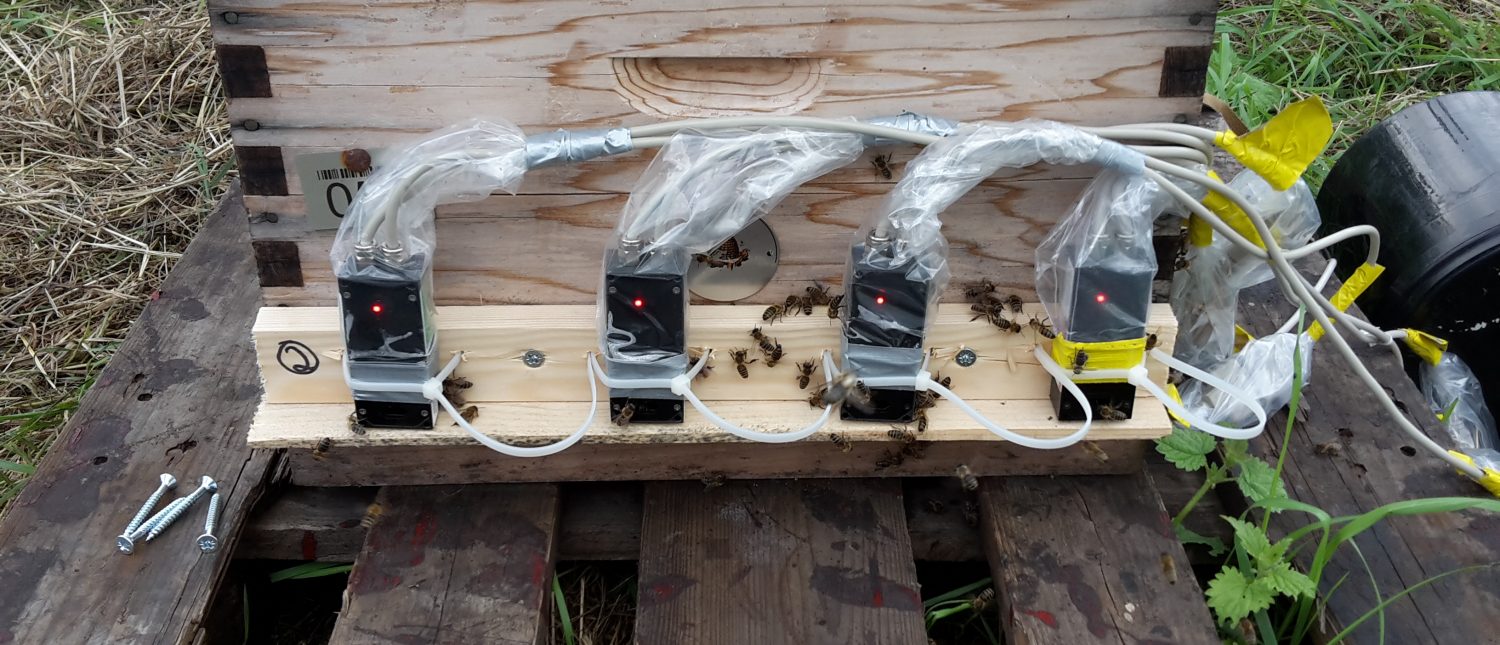
Visit our other sites
-
Fapas - Proficiency Testing
Globally recognised provider of proficiency tests, running over 400 tests annually across an extensive range of matrices and analytes
-
Great Crested Newts Testing
A single sample taken by an ecologist at any time during the newt breeding season can determine their presence or absence, saving you time and money
Creating safer plant protection products

Chemical companies developing plant protection products for growers need to ensure their pesticides provide effective protection against pests and diseases, at the same time as safeguarding essential pollinators, such as bees. As more compounds are withdrawn from the market due to their effect on pollinator and human health, chemical producers need expert support in developing safe and effective new products that meet the demands of growers, food retailers and consumers.
Fera has the research expertise and scientific resources to help you test products for their effects on pollinator survival, development and behaviour, enabling you to develop products that are safe for bees and other pollinators – and comply with all government regulations. Working with the national bee experts at Fera will give you access to a wealth of data and analysis on bee health, helping you to put pollinator health at the forefront of your product development – and sending a strong message to customers that you’re serious about safeguarding pollinators for the long term.
Selwyn Wilkins
Senior Bee Ecotoxicologist
The importance of demonstrating the safety of plant protection products on pollinator health

End-to-end support from the ecotoxicology specialists:
- Feasibility studies for new compounds providing high throughput efficacy testing against a range of pests, pathogens and weeds.
- Pollinator ecotoxicology studies (honey bees, bumblebees and solitary bees) to GLP. These include early stage laboratory tests through to higher tier testing (semi-field and field studies) to assess possible effects on pollinator health (impact on brood rearing, forager behaviour and mortality)
- Residue studies to investigate the potential movement of a compound or its metabolites through a system e.g. from crop to hive.
- Dossier preparation for submission to regulatory authorities.
- Expert advice on the content of product labels helping to remain within regulatory frameworks.
- UK field trials – providing access to regional field testing capabilities, in collaboration with farmers and growers.
Get in touch with us
info@fera.co.uk
With state-of-the-art laboratories and over 300 multi-disciplinary scientists, Fera provides the quality and breadth of support needed to meet the varied requirements of chemical product manufacturers.

Unrivalled research and testing capabilities
Fera’s testing services encompass the full range of pollinators, including bees, solitary bees and bumble bees. We select the most appropriate methods from those listed below to suit the specific needs of your project. We can work with your partner organisations to provide complementary services or we can offer a full end-to-end pollinator testing, analysis and reporting service to support your objectives.
Laboratory tests
- Adult bees acute toxicity – short-term tests to explore worst-case scenarios via the two main risk exposure routes for bees.
- Adult bees chronic toxicity – assesses the possible longer-term feeding effects of plant protection products on bees.
- In vitro honey bee larval toxicity – assesses the toxic effects of pesticides on honey bee larvae.
- Aged residue tests – extended tests to assess the toxicity of pesticide residues on plant residues, post-application to bees.
- Bee metabolism studies – examine the metabolism of plant protection products and the toxicity of the metabolites when ingested or absorbed by adult bees.
Field tests
- Bee brood tests – use photographic methods and bee brood software to monitor the development of different brood stages.
- Honey bee brood feeding test – similar to bee brood tests, but the test item is fed directly to free-flying honey bee colonies in sugar syrup.
- Honey bee effects tests – conducted under open-field conditions to provide realistic exposure scenarios. Tests can be designed to explore various aspects, including spray applications, seed treatments and risks from guttation. We can use Radio Frequency Identification Devices (RFID) to assess the potential effects of plant protection products on the foraging behaviour and mortality of worker bees.
- Solitary bee and bumble effects tests – bespoke semi-field and field studies under tunnel and open field conditions.
With state-of-the-art laboratories and 350 multi-disciplinary scientists, Fera provides the quality and breadth of support needed to meet the varied requirements of chemical product manufacturers. Our work can help you to get products to market more efficiently, by ensuring you comply with the latest EFSA guidelines on safety testing for plant protection products. We also have scientists who are specially trained to provide expert evidence in court on issues relating to pesticide exposure and bee health.
Find out how our pollinator services can support your business
Whether you simply need to generate product safety information to meet regulatory requirements or develop safer new plant protection products, Fera’s extensive pollinator services can support you every step of the way. Contact us today to find out how we can support your product testing and development.
Selwyn Wilkins
Senior Bee Ecotoxicologist
Why you can trust the national bee experts for your plant protection products safety testing needs
Case Studies

Metabolism/detoxification studies
We used a combination of our world-class honey bee, chemistry and chemical analysis expertise to identify key honey bee metabolites, including a previously unreported metabolite which provides evidence for a specific detoxification pathway of the customer’s compound which is not present for a more toxic compound in the same class of chemicals. Key honey bee metabolites for study were identified using non-targeted chemical analysis techniques such as liquid chromatography-time-of-flight-mass spectrometry (LC-MS-TOF) and full-scan gas chromatography-mass spectrometry (GC-MS). Likely candidate molecules from non-targeted data were selected based on structural similarities to the parent molecule. More sensitive, targeted mass spectrometric techniques were then used to follow the dynamics of metabolism of parent compound and the key metabolites in honey bees during laboratory dosing studies. A similar study with a more toxic compound from the same chemical class with known honey bee metabolites was undertaken for comparison.
Once the key metabolites and detoxification pathways had been identified we were also able to set-up a full honey bee field study to follow the fate of the compound and metabolites from field application to important bee matrices in the hive.
This information on honey bee toxicology and fate of residues following field application can be used to support the marketing of their product.

Radio Frequency IDentification tagging - field experiment
Many studies conducted under laboratory conditions have clearly demonstrated that insecticides have the potential to affect the ability of honey bees to return to the hive through effects on learning and memory, knockdown or flight. However, one of the problems encountered when considering such lab studies is the relevance of these experiments to what happens under actual field conditions. Over the last few years there has been interest in using the developing Radio Frequency Identification (RFID) as a tool for assessing flight and foraging behaviour of bees. This technology involves fixing small transponders to free flying bees and monitoring their activity by fixing readers to the front of the hive. The majority of these studies have involved artificial feeding of the bees either by feeding the bees directly or by giving them access to dosed feed from artificial feeders rather than under natural conditions of exposure i.e. open foraging on treated crops.
We were approached by customer who wanted to look at such a real life scenario. Using our wide ranging practical experience of handling bees and experience with the emerging technology Fera designed a large scale RFID tagging and monitoring study to determine the effects of foraging of honey bees (Apis mellifera L.) on oilseed rape grown from seed pesticide treated honeybee on homing behaviour. A total of 12 honeybee colonies were allocated to each treatment group, 4 located at the field edge and 4 each at approximately 500m and 1000m from the field. As part of the study tagged a staggering total of nearly 10,000 newly-emerged bees (approximately 300 bees per colony)– no mean feat in itself approximately 300) with Mic3 RFID transponders. These bees were then introduced to the test colonies. RFID readers fitted to the entrances of the test colonies were used to monitor the activity of the tagged bees for exposure phase (equivalent to the flowering period which was approximately 5 weeks). These activity data were analysed to assess any impact on flight activity of bees foraging on the treated compared to untreated crops.
A full description of the study can be seen in the paper Thompson, H., Coulson, M., Ruddle, N., Wilkins, S. and Harkin, S. (2016), Thiamethoxam: Assessing flight activity of honeybees foraging on treated oilseed rape using radio frequency identification technology. Environ Toxicol Chem, 35: 385–393. doi:10.1002/etc.3183.
This field study remains one of the largest scale tagging open field studies to have been carried out on bees and as well as helping to understand the possible effects of the test item on the foraging behaviour and life-span of the bees this study gave a fantastic insight into how such data may be used to look at the behaviour of bees for future work.

Pollinators can suffer from non-chemical threat including susceptibility to their own pests and diseases.
Pollinator Therapeutics
Over the last 30 years, Fera have amassed a wealth of expertise in developing and assessing the therapeutic benefits of various products designed to improve honey bee health. Our team of researchers and bee ecotoxicologists have been responsible for generating data that has led to the registration of many of the current health products available to beekeepers today. Our active membership on international panels and current project portfolio will allow us to continue to expand our expertise in this important area, ensuring we remain at the forefront of therapeutic development to help protect our important pollinators.
Additional Services
Pesticide residue testing
Our maximum residue level (MRL) detection service offers a valuable resource for food retailers and manufacturers. It enables us to test food products for pesticide residues, so you can manage risk effectively and ensure your produce is safe for human consumption.
Find out how our pollinator services can support your business
Whether you need to review existing pesticide polices to satisfy all stakeholders, or create comprehensive new guidelines for sustainable supply chain management, the experienced team at Fera can help. Contact us today to discuss your requirements.
When working with Fera, you are also working with an international centre of bee health, expertise that has experience of developing treatments to enhance pollinator health.
IN THIS SECTION

Bee Ecotoxicology
Our research expertise and scientific resources can help you to test your plant-protection products for their effects on bee survival, development and behaviour – helping you to develop products that are safe for bees and other pollinators.

Copyright © 2025 Fera Science Limited (“Fera”). All rights reserved.
For further information about how Fera uses any personal data collected from you, please see our Privacy Notice at www.fera.co.uk/privacy-policy.

